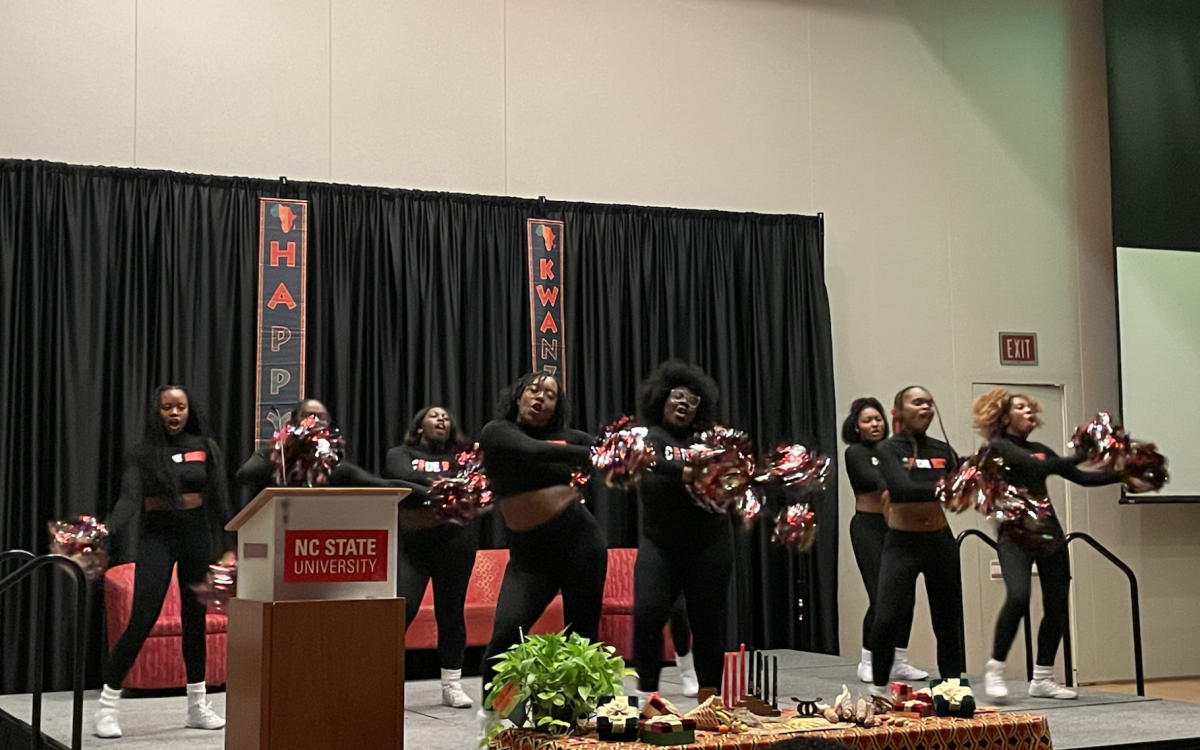The African American Cultural Center invited NC State students to come together and dine to celebrate Kwanzaa in “The Feast of Faith” event Nov. 17.
Throughout the event, members of the LGBTQ Pride Center, Women’s Center and Multicultural Student Affairs held speeches, performed songs and read out poems about Kwanzaa and its seven principles.
Sol Johnson, a fourth-year studying psychology, said while Kwanzaa is traditionally celebrated from Dec. 26 to Jan. 1, the celebration at NC State takes place before because students leave for winter break mid-December.
“We want to offer students an opportunity to come together and celebrate before they go home to celebrate with their families,” Johnson said. “I really enjoy coming together with members of my community to be in a space and just eat and embrace life and enjoy our experiences together.”
Brought to life by Maulana Karenga, a professor and chairman of Black studies at California State University, members of the Black and African American community honor their culture, heritage, elders and ancestors during this week of festivities. Each day, one of the seven principles of Kwanzaa is emphasized.
Leslie Cochran, administrative support specialist with Multicultural Student Affairs, said the principles are Umoja, Kujichagulia, Ujima, Ujamaa, Nia, Kuumba and Imani.
“The first principle is Umoja, which is the Swahili word for unity, the second one is Kujichagulia, self determination, followed by Ujima, which emphasizes collective work and responsibility,” Cochran said. “The fourth principle is called Ujamaa and focuses on cooperative economics, the fifth one is Nia which translates to purpose, the sixth one is called Kuumba and focuses on creativity and the last one is Imani, faith.”
angela gay-audre, director of the African American Cultural Center, said the center encourages students to find a principle that resonates with them and dig deep into its meaning.
“When you go to the ‘Feast of Faith’ and celebrate all the principles, you have an opportunity to learn something more, and think about what it means to you,” gay-audre said. “If somebody, for example, is particularly interested in the second principle of self determination, I would encourage them to find out what it means for them to self define and self govern.”
Jae Edwards, assistant director of the LGBTQ Pride Center, said Kwanzaa is a time for people to live and love in their Blackness.
“We show love through experiences that create the stories we pass on to next generations,” Edwards said. “We show it in the way we greet our loved ones or how we congratulate each other and come together in unity in all these collective experiences that make us laugh, cry and grow.”
Everyone was encouraged to actively participate in the event by sharing their version of a community “I Am” poem to highlight the second principle of self determination. They were asked to answer eight questions about who they are as individuals and as part of a community.
“As a clinical counselor, I believe in self determination and self actualization,” gay-audre said. “And so when I think about Kujichagulia, the principle of self determination, to me it is about sovereignty and that leads us back to how we can actually care for one another, care for ourselves and act as a collective.”
Community, collectiveness and cooperation were frequent themes mentioned at the event. Dr. Jameco McKenzie, director of Multicultural Student Affairs, cited a quote by Jamaican singer-songwriter Bob Marley to highlight the importance of collective work and responsibility.
“The greatness of a man is not in how much wealth he acquires but in his integrity and his ability to affect those around him positively,” McKenzie said, citing Bob Marley.
The event concluded with the honoring of African American and Black business owners in the Raleigh area and fall 2023 graduates.
“There’s not a lot of recognition for fall graduates aside from the big ceremony that honors them,” gay-audre said. “So, we want to make sure that we create another space for them as well.”
Johnson also said she was happy to see how the event changed compared to previous years and how different forms of art were used to educate the audience about Kwanzaa.
“This representation of different forms of art is something that hadn’t been implemented in previous years,” Johnson said. “This year, we had dance, we had songs, we had people reading books and poems, and I really enjoyed how they incorporated different forms of expressing art.”














